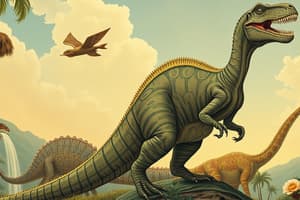Podcast
Questions and Answers
Which characteristic distinguishes dinosaurs from marine reptiles?
Which characteristic distinguishes dinosaurs from marine reptiles?
- Bipedal gait (correct)
- Fully adapted to aquatic life
- Tetrapod skeleton
- Presence of scales
Which of the following groups is classified as marine reptiles?
Which of the following groups is classified as marine reptiles?
- Triceratops
- Plesiosaurs (correct)
- Sphenacodontia
- Crocodiles
What feature is indicative of the tetrapod classification in dinosaurs?
What feature is indicative of the tetrapod classification in dinosaurs?
- Fully aquatic adaptations
- Diminished limb structure
- Presence of feathers only
- Lower temporal fenestra (correct)
Which dinosaur is mentioned as a representative derived bird?
Which dinosaur is mentioned as a representative derived bird?
What characteristic does not apply to dinosaurs?
What characteristic does not apply to dinosaurs?
What is one of the primary objectives of the ERTH 2401 course?
What is one of the primary objectives of the ERTH 2401 course?
Who is the instructor of the ERTH 2401 course?
Who is the instructor of the ERTH 2401 course?
Which of the following topics will NOT be covered in the ERTH 2401 course?
Which of the following topics will NOT be covered in the ERTH 2401 course?
What is expected of students regarding academic accommodations?
What is expected of students regarding academic accommodations?
What is the designated course textbook for ERTH 2401?
What is the designated course textbook for ERTH 2401?
Which TA is assigned to students with the last names starting from Kb to Pa?
Which TA is assigned to students with the last names starting from Kb to Pa?
Which area will the course NOT cover concerning dinosaurs?
Which area will the course NOT cover concerning dinosaurs?
What is required for students to understand about the geological time scale?
What is required for students to understand about the geological time scale?
What geological time period marks the beginning of complex animal life with the first protozoa?
What geological time period marks the beginning of complex animal life with the first protozoa?
During which period did the first fossil evidence of animals with bilateral symmetry appear?
During which period did the first fossil evidence of animals with bilateral symmetry appear?
Which geological period is known for the Cambrian explosion and the diversification of living things in the oceans?
Which geological period is known for the Cambrian explosion and the diversification of living things in the oceans?
What development in the atmosphere around 600 million years ago allowed for the formation of an ozone layer?
What development in the atmosphere around 600 million years ago allowed for the formation of an ozone layer?
Which of the following organisms includes arthropods such as trilobites and crustaceans that first appeared in the Early Cambrian?
Which of the following organisms includes arthropods such as trilobites and crustaceans that first appeared in the Early Cambrian?
What significant fossil site preserved the Burgess Shale fauna around 508 million years ago?
What significant fossil site preserved the Burgess Shale fauna around 508 million years ago?
What major characteristic defines phylum Chordata that distinguishes them from other animal phyla?
What major characteristic defines phylum Chordata that distinguishes them from other animal phyla?
What era follows the Precambrian time known for the appearance of the first complex life forms?
What era follows the Precambrian time known for the appearance of the first complex life forms?
What significant evolutionary development allowed reptiles to rapidly evolve during the Late Carboniferous period?
What significant evolutionary development allowed reptiles to rapidly evolve during the Late Carboniferous period?
What type of skull is characteristic of synapsids?
What type of skull is characteristic of synapsids?
What was the primary cause of the Carboniferous Rainforest Collapse?
What was the primary cause of the Carboniferous Rainforest Collapse?
Which group of plants began to radiate during the Permian period?
Which group of plants began to radiate during the Permian period?
What was the estimated impact of the Permian-Triassic extinction event?
What was the estimated impact of the Permian-Triassic extinction event?
What major geologic feature dominated the Earth during the Early Triassic?
What major geologic feature dominated the Earth during the Early Triassic?
Which reptiles thrived in the oceans during the Jurassic period?
Which reptiles thrived in the oceans during the Jurassic period?
Which of the following groups of organisms first appeared during the Jurassic period?
Which of the following groups of organisms first appeared during the Jurassic period?
Which group of dinosaurs was dominant in the Northern Hemisphere during the Late Cretaceous?
Which group of dinosaurs was dominant in the Northern Hemisphere during the Late Cretaceous?
Which of the following dinosaurs went extinct at the Cretaceous/Paleogene Boundary?
Which of the following dinosaurs went extinct at the Cretaceous/Paleogene Boundary?
What significant geological event occurred during the Late Triassic period?
What significant geological event occurred during the Late Triassic period?
During which time period did hadrosaurs and ceratopsians diversify significantly?
During which time period did hadrosaurs and ceratopsians diversify significantly?
What was the climate condition during the Late Jurassic period?
What was the climate condition during the Late Jurassic period?
Flashcards are hidden until you start studying
Study Notes
Course Overview
- Course ERTH 2401 focuses on dinosaurs, taught by Dr. Michael J. Ryan.
- Course structure includes introductions, definitions, and a review of Earth's history.
- Syllabus covers important dates for midterms, academic accommodations, and instructor contact methods.
Dinosaur Definition
- Dinosaurs are defined as tetrapods, characterized by certain skeletal features, including a lower temporal fenestra.
- They possess an amnion, have limbs positioned directly beneath their bodies, allowing a narrow gait.
- Distinction made between dinosaurs and other life forms like marine reptiles (e.g., ichthyosaurs, plesiosaurs) and pterosaurs.
Geological Time Scale
- Key dates to remember in the Mesozoic include:
- 251.9 Ma: Beginning of Mesozoic Era.
- 201.3 Ma: Start of the Jurassic Period.
- 66.0 Ma: Cretaceous-Paleogene boundary, marking the extinction of all non-avian dinosaurs.
History of Life on Earth
- Late Proterozoic (1000 - 541 Ma): First protozoa appear, leading to the evolution of animals by accumulating oxygen in the atmosphere.
- Cambrian Explosion (541 - 509 Ma): Modern animal phyla appear, marking diversification in ocean life.
- Late Carboniferous (323 - 299 Ma): Synapsids evolve into mammals; significant climate change leads to Carboniferous Rainforest Collapse.
- Permian (299 - 251 Ma): Major land and marine extinctions due to the Permian-Triassic extinction event, affecting up to 95% of marine species.
Dinosaur Evolution
- Early Triassic (~240 Ma): Life recovers post-Permian extinction; emergence of first reptiles.
- Late Triassic (237 - 201 Ma): First theropod dinosaurs, including Coelophysis, and basal dinosaurs appear.
- Jurassic (201 - 174 Ma): Birth of lizards and birds; dinosaurs become the dominant terrestrial vertebrates.
- Late Cretaceous (100 - 66 Ma): Diversification of hadrosaurs and ceratopsians; rise of mosasaurs in marine environments.
Extinction Events
- Cretaceous-Paleogene boundary (66.0 Ma): All non-avian dinosaurs are wiped out, leading to a significant shift in earth's biodiversity.
Teaching Assistants
- TAs are assigned by last name initials, with contact information provided for course-related queries.
- Each TA focuses on specific areas of study related to dinosaurs and ecosystems.
Key Concepts on Dinosaurs
- Dinosaurs existed on all continents and adapted to various ecological niches.
- Differentiation between dinosaurs and other prehistoric creatures is crucial for understanding their unique evolutionary traits.
Studying That Suits You
Use AI to generate personalized quizzes and flashcards to suit your learning preferences.




